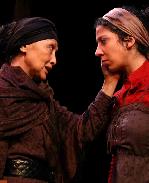SITE GUIDE
SEARCH
REVIEWS
REVIEW ARCHIVES
ADVERTISING AT CURTAINUP
FEATURES
NEWS
Etcetera and
Short Term Listings
LISTINGS
Broadway
Off-Broadway
NYC Restaurants
BOOKS and CDs
OTHER PLACES
Berkshires
London
California
New Jersey
DC
Philadelphia
Elsewhere
QUOTES
TKTS
PLAYWRIGHTS' ALBUMS
LETTERS TO EDITOR
FILM
LINKS
MISCELLANEOUS
Free Updates
Masthead
Writing for Us
A CurtainUp Review
Widows
By Elyse Sommer
|
By allowing the voices of the disappeared and the families waiting for their return to speak to each other using my faraway words I was also finding a way of going back myself to the faraway country where my own body and, of course, these very words I was writing, were forbidden..—Ariel Dorfman explaining the genesis of Widows.
|

Ching Valdes-Aran and Sarah Nina Hayon
(Photo: Colin D. Young)
|
Just a day after I saw Widows, an op-ed piece by Roger Cohen (NYTimes, 1/13/08--"Lost Children, Lost Truths") chronicled the distressing true story of twin boys whose identity was lost during the 1980s reign of terror in Argentina when imprisoned pregnant women were allowed to live long enough to give birth to children who were then given to members of the ruling Junta. If Cohen were a playwright instead of a journalist, he might well have written a powerful drama about his involvement with one such story. It seems he was in touch with the family of one of these women/ His story of how her babies were kidnapped by the officer who killed her brought the officer to justice, but it turned into a case of horrible unintended consequences for the twin boys. (DNA tests proved the children were born to a different murdered woman and the boys were not reunited with loving relatives but ended up having miserable childhoods). It also makes you understand Ariel Dorfman's need to bear witness to the tragedy of the "disappeared" and why Widows is timely even though written a quarter century ago.
Dorfman, being a poet as well as novelist and playwright, dramatized his tale with a mix of realistic story telling and magic realism. The play version is now being presented with a large cast in a tiny theater. It pits a group of women and children in a nameless country ravaged by civil war against the current officers in charge of their village. The chief officer (Mark Alhadeff) os a captain new to this post who's determined to bring the village into the modern world and lay the past (his own as well as the villagers') to rest. But the women can't put an end to their hopeless waiting for the return of their "disappeared" men without bodies to bury. The oldest, Sofia Fuentes (Ching Valdes-Aran), who's lost a husband and son, has given up any semblance of normal living but spends all her days sitting at the river bank where the women do their washing. When a no longer recognizable body washes ashore, the desperate women all lay claim to it and the Captain's sees his chances of bringing modernity to this backward village grow dimmer each day.
Director Hal Brooks and his design team have reconfigured the tiny Theater B so that the audience sits at either side of a platform stage that is itself divided to include a stream. It's no mean feat to fit the large cast into such a tiny playing area, but Brooks moves them around smoothly and elicits generally solid performances, especially from Valdes-Aran and Mark Alhadeff. The vivid staging, dedicated performances and Dorfman's often pretentiously poetic script should make for a riveting two and a half hours. But without anything to lighten the heavy mood, or a glimmer of hope or any suspense as to the play's outcome, Brooks' extremely leisurely pacing makes that inevitably depressing conclusion take too long to come.
|
WIDOWS Adapted from Ariel Dorfman's 1983 novel Directed by Hal Brooks. Cast: Josh Alexander (the Doctor/Father Gabriel/Kastoria's Brother), Mark Alhadeff (the Captain), Veronica Cruz (Cecilia Sanjines), Sam Dingman (Soldier), Sarah Nina Hayon (Alexandra Fuentes), Mercedes Herrero (Teresa), Guiesseppe Jones (the Lieutenant), Ana Cruz Kayne (Fidelia Fuentes), Ephraim Lopez (Soldier), Melissa Miller (Beatrice/Rosa), Sean J. Moran (Alexis Fuentes), Gita Reddy (Katherina), James Saba (Phillip Kastoria/Alonso Fuentes), Anca Suiu (Mariluz), Joaquín Torres (Emmanuel), Ching Valdes-Aran (Sofia Fuentes), Audrey Lynn Weston (Yanina Fuentes) and Yan Xi (Ramona). Sets: Wilson Chin Lights: Colin D. Young Costumes: Kimberly Glennon Sound: Matt O'Hare Running Time: 2 1/2 hours, includes one intermission Reverie Productions at 59E59 Theaters, Theater B (212) 279-4200 From 1/10/08; opening 1/18/08; closing 2/03/08 Tuesday — Saturday at 8:15 PM and Sunday at 3:15 PM. Tickets are $20 reviewed by Elyse Sommer at January 13th press performance |
Try onlineseats.com for great seats to
Wicked
Jersey Boys
The Little Mermaid
Lion King
Shrek The Musical

The Playbill Broadway YearBook

Leonard Maltin's 2007 Movie Guide


Wicked
Jersey Boys
The Little Mermaid
Lion King
Shrek The Musical

The Playbill Broadway YearBook

Leonard Maltin's 2007 Movie Guide


